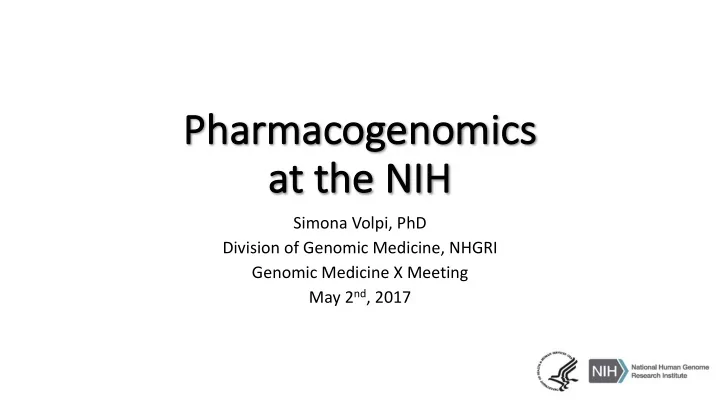

Pharmacogenomics cs at at the NIH Simona Volpi, PhD Division of Genomic Medicine, NHGRI Genomic Medicine X Meeting May 2 nd , 2017
Pharmacogenomics at the NIH Meeting • December 14, 2016 • Organized by NHGRI’s Division of Genomic Medicine staff • Representatives from 12 NIH ICs presented their ICs’ involvement in PGx research • Goal: to survey the landscape of NIH-funded PGx research to help coordinate IC efforts and inform the May 2017 GM X meeting • Information included: resources developed, programs and consortia efforts, award mechanisms
Outline • Resources • Clinical trials • Network Efforts • Meeting outcome
Resources NCBI supports 4 main PGx resources: • Genomic Test Registry (GTR) • international registry of available genetic tests • ~5,000 orderable tests • ClinVar • clinical significance of genomic sequence variations and their relationship to phenotypes • MedGen • phenotype resource for information on conditions with genetic component • Medical Genetic Summaries • structured reviews about genetic variants and drug responses
Resources (cont’d) Supported by NHGRI: • IGNITE Spark Toolbox • to help clinicians incorporate genomics into their practices, researchers study the best ways to use genomics in healthcare and educators provide genomic training to future healthcare providers. • Sequence and Phenotype Integration Exchange (SPHINX) • a web-based tool for exploring data for hypothesis generation, especially around drug response implications of genetic variation across the eMERGE PGx cohort. Supported by NIDDK: • Type 2 Diabetes Knowledge Portal • goal is to increase the number of new diagnostics and therapies for patients while reducing the time and cost of developing them.
Resources (cont’d) Supported by NIGMS: • Clinical Pharmacogenetics Implementation Consortium (CPIC) - NHGRI • Pharmacogenomics Knowledgebase (PharmGKB) • PGRN-PiLS • The PGx iPSC Library and Service (PiLS) is the first resource of its kind that provides PGRN members the ability to access and contribute towards iPSC library for pharmacogenomics research. • F-CAP (Functionalization of Variants in Clinically Actionable Pharmacogenes) • Pharmacogenetics of Membrane Transporters Database (PMT) • goal is to understand the genetic basis for variation in response for drugs that interact with membrane transporters.
Clinical Trials Supported by NCI: • Adjuvant Lung Cancer Enrichment Marker Identification and Sequencing Trials (ALCHEMIST) • Lung-MAP • Molecular Analysis for Therapy Choice (MATCH) Supported by NIMH: • Pharmacogenomics of Mood Stabilizer Response in Bipolar Disorder (PGBD) • Neurobiology of Treatment Responses in Major Depressive Disorder (MDD)
Network Efforts • Supported by NIDDK • Drug-Induced Liver Injury Network (DILIN) • create a registry of DILI cases • identify clinical, immunological, and environmental risk factors for drug- and CAM-mediated hepatotoxicity • Supported by NIGMS (primarily) • Pharmacogenomics Research Network (PGRN) • lead research for discovery and translation of genomic variation influencing therapeutic and adverse drug effects • Supported by OD • The Precision Medicine Initiative (PMI) hosts The All of Us℠ Research Program. • The National Institutes of Health Clinical Center (CC)
Network Efforts (cont’d) • Supported by NHGRI • Implementing Genomics in Practice (IGNITE) • share and disseminate data from multiple sites implementing PGx testing to contribute to the evidence base of metrics and health-related outcomes gained from using PGx information in clinical care. • The Clinical Genome Resource (ClinGen) PGx WG • evaluate and annotate PGx genes, develop systematic methods for representing and depositing knowledge into ClinVar, and reconcile nomenclatures for pharmacogenomics variants. The PGx WG has proposed four categories of PGx variants to facilitate the reconciliation of PGx nomenclature. • Electronic Medical Records and Genomics (eMERGE) PGx • validate actionable variants in a CLIA-certified environment, and to integrate PGx variants into EMRs for use in clinical treatment.
Ch Challenges s Identifi fied and Potential Syn ynergies s an and Collab llaboratio tions • Standardize the PGx allelic nomenclature and relevant phenotypes across all datasets and resources • Identify and assess all the PGx resources currently available to the research and clinical communities • Reduce unproductive duplication and overlap among resources • Population diversity remains a challenge • ADR • Effectiveness of pre-emptive genotyping should be assessed PGx- wide rather than drug-by-drug or disease-by-disease
Ch Challenges s Identifi fied and Potential Syn ynergies s an and Collab llaboratio tions (cont’d) • Costs need to be considered – pre-emptive testing • Engaging payers for reimbursement – evidence missing? • Translating PGx data into cancer treatments and precision oncology • Immunopharmacology should be explored for applications beyond cancer and infectious diseases • Lack of biological markers (psychiatry) • NIH ICs need to collaborate • Implementation projects examples • Share samples and databases • Animal, iPSC models of tox and epi/genomics of drug response
Thank you! NHGRI • CC Barry Goldspiel Melpi Kasapi • NCBI Wendy Rubinstein Teri Manolio • NCI Kelly Filipski, Min Song • NHLBI Antonello Punturieri • NIAMS Susana Serrate-Sztein, Yan Wang • NICHD Zhaoxia Ren • NIDA Jonathan Pollock • NIDDK Jenna Baker, Aaron Pawlyk • NIGMS Rochelle Long • NIMH Geetha Senthil • NINDS Vicky Whittemore • PMI Carolyn Hutter
Recommend
More recommend